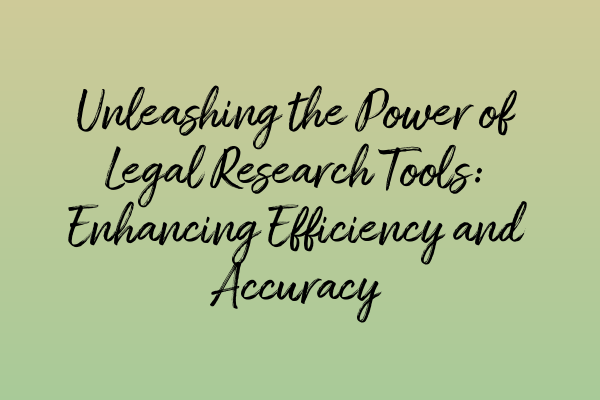Unleashing the Power of Legal Research Tools: Enhancing Efficiency and Accuracy
In the fast-paced world of law, staying on top of current legislation, case law, and legal precedents is crucial. Being equipped with the right legal research tools can vastly enhance the efficiency and accuracy of your work as a solicitor. Whether you are a seasoned professional or just starting out in your legal career, utilizing these tools can give you a competitive edge and allow you to provide your clients with the highest level of service. In this article, we will explore the power of legal research tools and how they can revolutionize the way you practice law.
1. Comprehensive Legal Databases
An essential component of any solicitor’s toolkit is a comprehensive legal database. These databases are a treasure trove of legal information, containing statutes, regulations, case law, and other legal materials. The key to harnessing the power of these databases is knowing how to effectively search and filter the vast amount of information they contain.
By using targeted keywords and advanced search operators, you can quickly find relevant case law, precedents, and legal commentary. These databases often provide powerful search features such as Boolean operators, proximity searching, and filtering options, allowing you to narrow down your search results and find the most relevant information in a fraction of the time.
Private Prosecutions: Exploring Non-Governmental Prosecutions in Criminal Cases
Understanding Drug-related Offences: Laws and Penalties in the UK
Demystifying Criminal Law Procedures: A Step-by-Step Guide
Rights of the Accused: Protecting Individual Liberties in Criminal Proceedings
Magistrates’ Court vs Crown Court: Understanding Key Differences
2. Case Law Research Tools
When building a legal argument or preparing a case, having access to a reliable case law research tool can make all the difference. These tools allow you to search for specific cases and review the judgments, providing valuable insights and legal principles that can strengthen your argument.
Some case law research tools even offer advanced features like visualizations, allowing you to see how different cases are connected and how the law has evolved over time. They can also provide the ability to save and annotate cases, making it easy to refer back to relevant precedents when needed.
3. Legal Analytics Tools
Legal analytics tools have emerged as a game-changer in the legal industry. These tools leverage artificial intelligence and machine learning algorithms to analyze vast amounts of legal data and provide valuable insights. They can help you identify trends in court rulings, assess the strength of a case, and make data-driven decisions.
By utilizing legal analytics tools, you can predict the potential outcome of a case, evaluate the reputation and track record of opposing counsel, and even identify judges’ tendencies and biases. This information can be incredibly valuable when strategizing your approach and advising clients.
4. Citation Management Tools
In the age of digital research, keeping track of citations and maintaining accurate reference lists can be a time-consuming task. Citation management tools automate the citation process, allowing you to easily generate citations in the appropriate format.
These tools can also help you organize and manage your reference library, ensuring that you have quick and easy access to the sources you need. By using citation management tools, you can save time and eliminate the risk of missing important citations in your legal documents.
5. Blockchain for Legal Research
Blockchain technology is revolutionizing various industries, and the legal field is no exception. Blockchain offers many benefits when it comes to legal research, including enhanced security, immutability of records, and the ability to verify the authenticity of legal documents. Using blockchain for legal research can provide an additional layer of trust and reliability, ensuring that the information you rely on is accurate and tamper-proof.
Conclusion
In an increasingly digital world, leveraging the power of legal research tools is essential for solicitors to stay ahead. Comprehensive legal databases, case law research tools, legal analytics tools, citation management tools, and blockchain technology all hold immense potential to enhance the efficiency and accuracy of legal research. By harnessing these tools and staying up-to-date with the latest advancements, solicitors can provide their clients with the highest level of service and achieve better outcomes in their legal cases.


Leave a Reply